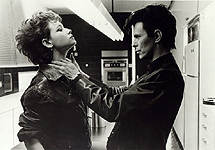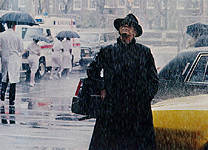
[Archive] [Links] [Store] [Home]
e-mail:Smokey X. Digger
The Hunger 1983, Dir. Tony Scott
Starring: RATING
|
Well what have we here? Some call it an art film. Catherine Deneuve in the lead role would reinforce that notion. Others refer to it as the first film to be influenced by the insidious force that is MTV. There is a rock star involved here, David Bowie, and his presence usually insures a film some kind of cult status. I agree with the MTV influence, and I think what we have here is the film that signifies the transition to depicting vampires as trendy, glamorous, and overtly sexual creatures. The first major screen depiction of a vampire was less than glamorous, Murnau's Nosferatu. While Lugosi's Dracula was a seducer, and Christopher Lee's Count possessed an animalistic sexuality, their lifestyles were far from glamorous. They were first and foremost monsters, sleeping in caskets and dwelling in musty castle vaults. In The Hunger the decrepit castle is replaced by a New York loft full of priceless art, and the sleeping quarters are no longer coffins filled with the earth of the vampire's native land but a bed with satin sheets. These vamps are obviously wealthy, always dressed impeccably, spending their days playing the piano and the cello and giving violin lessons to the girl from across the street. They are normal people, nothing suggesting that they are damned creatures. The only concession to the myth of the vampire is the unnatural strength and ability to disappear and reappear exhibited by Deneuve's character. Fangs are never evident; the victims are killed by blades concealed in ankh pendants, soon to become the pendant of choice for "misunderstood" teenagers everywhere.
Denueve is Miriam, a 2000 year old vampire. Bowie is John, her vampire lover. Together they stalk the dance clubs of New York, looking for fresh victims. Miriam has the secret to immortality, but it doesn't quite work for John as he suddenly begins to age at an accelerated rate. Enter Sarah (Susan Sarandon), a doctor specializing in geriatrics who Miriam and John believe can help solve their problem, but they don't have the same solution in mind. John withers and dies and Miriam, after much gnashing of teeth and chewing of scenery, puts him in a coffin in the attic with several other similar boxes. Apparently, Miriam's been doing this for a while. She then sets to seducing her next "life" partner, Sarah. Let's just say that Catherine Denueve and Susan Sarandon were the last two women I ever expected to see in a steamy lesbian scene. Miriam is foiled in her plot by the reawakening of her twice-dead ex-lovers, who shuffle about like extras in a George Romero film. They push her over a railing, impaling her on some manner of scultpure. They crumble into dust, and Sarah boxes Miriam up (in a coffin, get your mind out of the gutter). The film ends with Sarah standing on the balcony of the loft as Miriam's screams are audible in the background.
You can see the effects of this movie on the vampire flicks that came after quite easily. Wes Craven's Dracula 2000 is accompanied by a soundtrack full of today's hottest heavy bands, with the exception of Slayer, they were yesterday's (Reign In Blood rocks). SIDENOTE: When's the last time Wes Craven has done anything good? And if you say Scream, your Iniquity Films privileges are revoked. Back to the subject. Gary Oldman's Count in Francis Ford Stoker's Dracula reflects the romanticism that was at least attempted in The Hunger, and I'd mention Interview With the Vampire but there is a point I won't go beyond.
IN CLOSING: I'll admit I was intrigued by the concept of Bowie and Deneuve playing a vampire couple, but any curiosity I might have harbored was demolished by the utter tedium of this movie. The story was half-assed, the pacing was slow, and the presence of classical music does not an art film make. Don't get too excited about Bowie, he gets only about 20 minutes of screen time, during most of which he's covered in makeup. When this film was finished, I had no overwhelming reaction to it. It doesn't leave the viewer feeling anything, it just seems like something that happened a long time ago. Director Tony Scott went on to do True Romance so he did have some kind of potential, but it was pretty much all wasted on The Hunger. Ignore it. |



